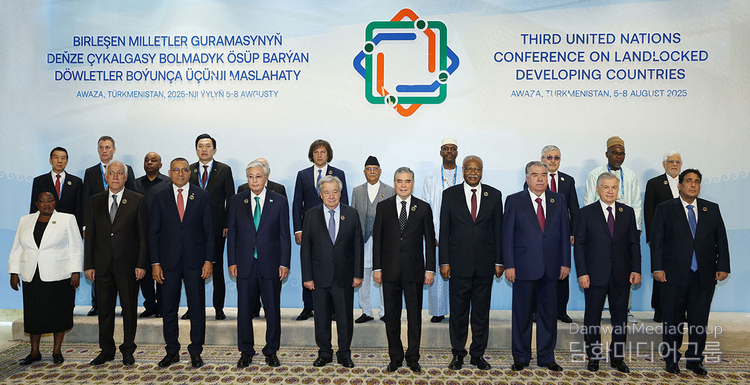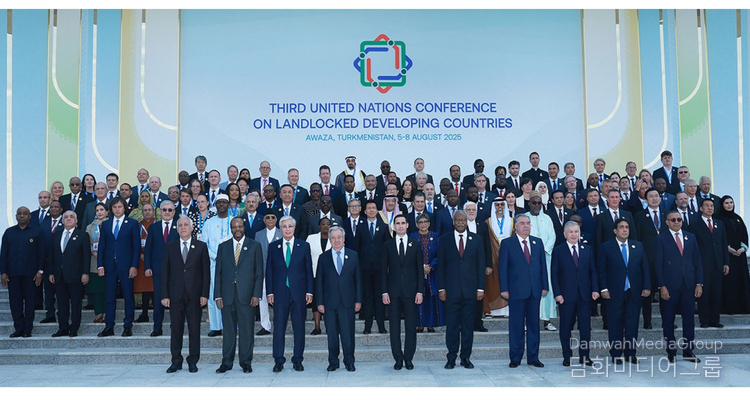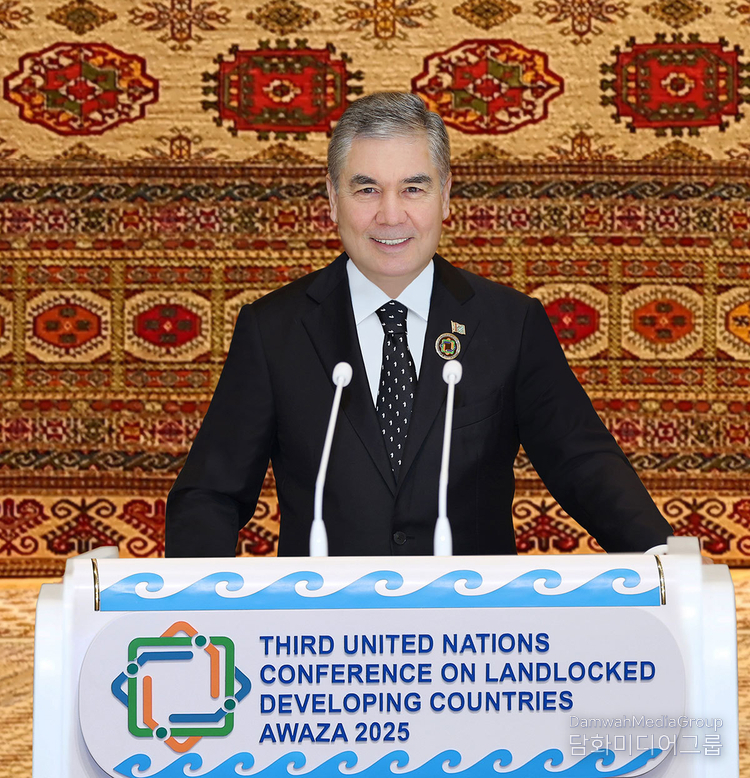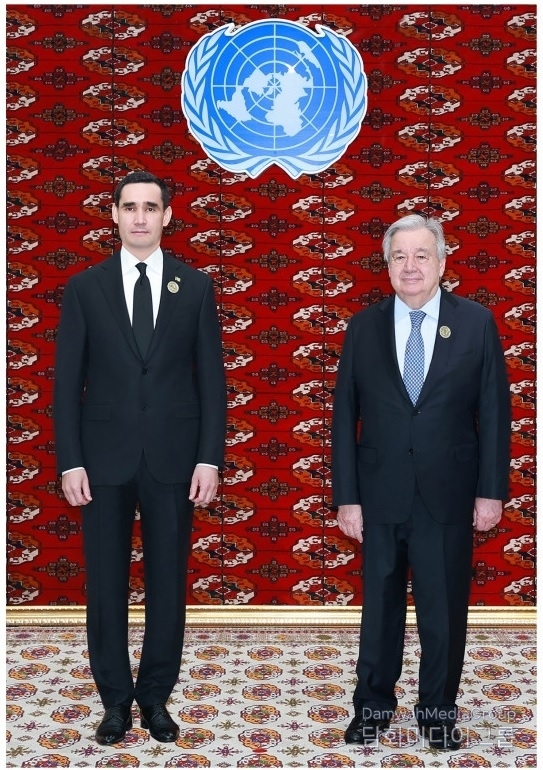By UN Journal Lee Kap-soo
From August 5 to 8, 2025, the Third United Nations Conference on Landlocked Developing Countries (LLDC3) took place at the Awaza National Tourist Zone along the Caspian Sea in Turkmenistan. The Conference transformed this picturesque coastal destination into a vibrant hub of global diplomacy, as leaders from around the world gathered to chart a development path for the 32 landlocked developing countries (LLDCs).
The opening ceremony, held on August 5, was a compelling display of international solidarity. His Excellency Gurbanguly Berdimuhamedov, National Leader of the Turkmen People, the Chairman of the Halk Maslahaty of Turkmenistan, welcomed dignitaries including His Excellency Mr. António Guterres, Secretary-General of the United Nations, and His Excellency Mr. Philemon Yang, President of the seventy-ninth session of the United Nations General Assembly. Their presence signaled the United Nations' strong institutional commitment to supporting LLDCs.

Heads of State and Government delivered keynote addresses, underscoring the critical importance of the LLDC3 agenda. Distinguished speakers included His Excellency Mr. Kassym-Jomart Tokayev, President of the Republic of Kazakhstan; His Majesty King Mswati III of the Kingdom of Eswatini; His Excellency Mr. Shavkat Mirziyoyev, President of the Republic of Uzbekistan; His Excellency Mr. Vahagn Khachaturyan, President of the Republic of Armenia; His Excellency Mr. Emomali Rahmon, President of the Republic of Tajikistan; His Excellency Mr. Mohamed Yunus al-Menfi, Chairman of the Presidential Council of the State of Libya; and His Excellency Mr. Carlos Manuel Vila Nova, President of the Democratic Republic of São Tomé and Príncipe.
On August 6, His Excellency Mr. Serdar Berdimuhamedov, President of Turkmenistan, held high-level bilateral meetings with a range of leaders. These included His Excellency Mr. Mohammad Reza Aref, First Vice President of the Islamic Republic of Iran; His Excellency Mr. Wang Yong, Vice Chairman of the National Committee of the Chinese People’s Political Consultative Conference; His Excellency Mr. Adylbek Kasymaliev, Chairman of the Cabinet of Ministers of the Kyrgyz Republic; His Excellency Mr. Dmitry Patrushev, Deputy Prime Minister of the Russian Federation; and other senior officials. These meetings focused on strengthening cooperation in trade, energy, infrastructure, and cultural exchange.
A cultural highlight of the conference was the Festival of Friendship, an event curated by Turkmenistan to showcase regional heritage, strengthen people-to-people ties, and underscore the importance of cultural diplomacy in multilateral cooperation.
The official agenda of LLDC3 featured high-level sessions including a Private Sector Forum, co-organized with the United Nations Industrial Development Organization (UNIDO), the International Telecommunication Union (ITU), the European Investment Bank, and other international partners. This forum explored investment opportunities in trade, connectivity, and digital infrastructure.

Simultaneously, thematic roundtables took place. On August 5, topics included “Structural Transformation, Diversification, and Science, Technology and Innovation as Drivers of Prosperity” and a unique “Dialogue Between Generations”, which emphasized the role of youth and intergenerational collaboration in sustainable development.
On August 6, discussions centered on digital innovation, particularly the session “Connectivity: Digital Potential Beyond Borders”, co-hosted by the Office of the High Representative for the Least Developed Countries, Landlocked Developing Countries and Small Island Developing States (UN-OHRLLS) and the ITU. This session emphasized the potential of digital trade and infrastructure to bridge geographic isolation and enhance gender inclusion in LLDCs.
That day also marked the inaugural observance of the International Day for LLDC Awareness, following a recent UN General Assembly resolution. Remarks by Her Excellency Ms. Rabab Fatima, United Nations Under-Secretary-General and High Representative for UN-OHRLLS; His Excellency Mr. Rashid Meredov, Deputy Chairman of the Cabinet of Ministers and Minister of Foreign Affairs of Turkmenistan; and His Excellency Mr. Diego Pacheco, Permanent Representative of the Plurinational State of Bolivia to the United Nations, emphasized the urgent need for global attention to LLDC challenges – from climate vulnerability to infrastructure gaps.

Additional side events covered a broad spectrum of issues, including digitalization of transport documentation (in cooperation with the World Trade Organization), food security, regional agricultural research initiatives, and climate change risks such as glacier melt.
All sessions supported the newly adopted Awaza Programme of Action for 2024-2034, which aims to accelerate LLDCs’ development through innovation, connectivity, agriculture, and inclusive finance.
On August 7, the focus shifted to sustainable infrastructure and green logistics, with sessions discussing “smart” transport systems, public-private partnerships, and resilience in transit networks. Emphasis was placed on the digital backbone needed to sustain infrastructure growth, with pledges of technical support from international institutions.

A standout moment was the Women Leaders’ Meeting, themed “From Commitments to Change: Women as Drivers of the Awaza Programme of Action.” Led by Under-Secretary-General Rabab Fatima and Her Excellency Ms. Dunyagozel Gulmanova, Chairperson of the Mejlis (Parliament) of Turkmenistan, the event culminated in a declaration reaffirming the role of women in implementing sustainable development strategies.
A ministerial-level meeting on South-South and Triangular Cooperation brought LLDC delegates together to explore solidarity-driven partnerships and regional innovation. Participants advocated for a blended approach combining public, private, and multilateral resources.
The Conference concluded on August 8 with a plenary closing session, where delegates endorsed the Awaza Political Declaration and ratified the Awaza Programme of Action for 2024-2034, establishing a robust, forward-looking agenda for LLDCs over the next decade.
In his remarks, His Excellency Mr. Rashid Meredov, Deputy Chairman of the Cabinet of Ministers and Minister of Foreign Affairs of Turkmenistan, announced the approval of five major initiatives, including, the establishment of regional agricultural research centers; creation of an infrastructure investment mechanism; formation of a high-level expert group on the freedom of transit; launch of a trade integration support program in partnership with the World Trade Organization, as well as the formation of a negotiation group on climate finance under the United Nations Framework Convention on Climate Change (UNFCCC).
United Nations Under-Secretary-General Rabab Fatima praised LLDC3 as the most ambitious and successful conference in the LLDC process to date. She applauded Turkmenistan for its exceptional organization and diplomatic leadership, declaring that Awaza now symbolizes “new hope and new opportunities” for over 600 million people living in LLDCs.
She further highlighted the importance of circular economy, sustainable transport, health, and inclusive digital infrastructure as priorities raised throughout the forum.
The conference concluded with a clear directive: to embed the Awaza Programme of Action into national development strategies, track progress through strong partnerships, and ensure that LLDCs are not left behind in the global push for sustainable development.
Third United Nations Conference on Landlocked Developing Countries (LLDC3) in Awaza, Turkmenistan, marked a turning point - blending cultural unity, digital transformation, and strategic policy action into one historic gathering. Under the leadership of Turkmenistan, the Conference set a bold new course for landlocked developing countries, reaffirming the international community’s shared responsibility to build a more resilient, inclusive, and connected future.




